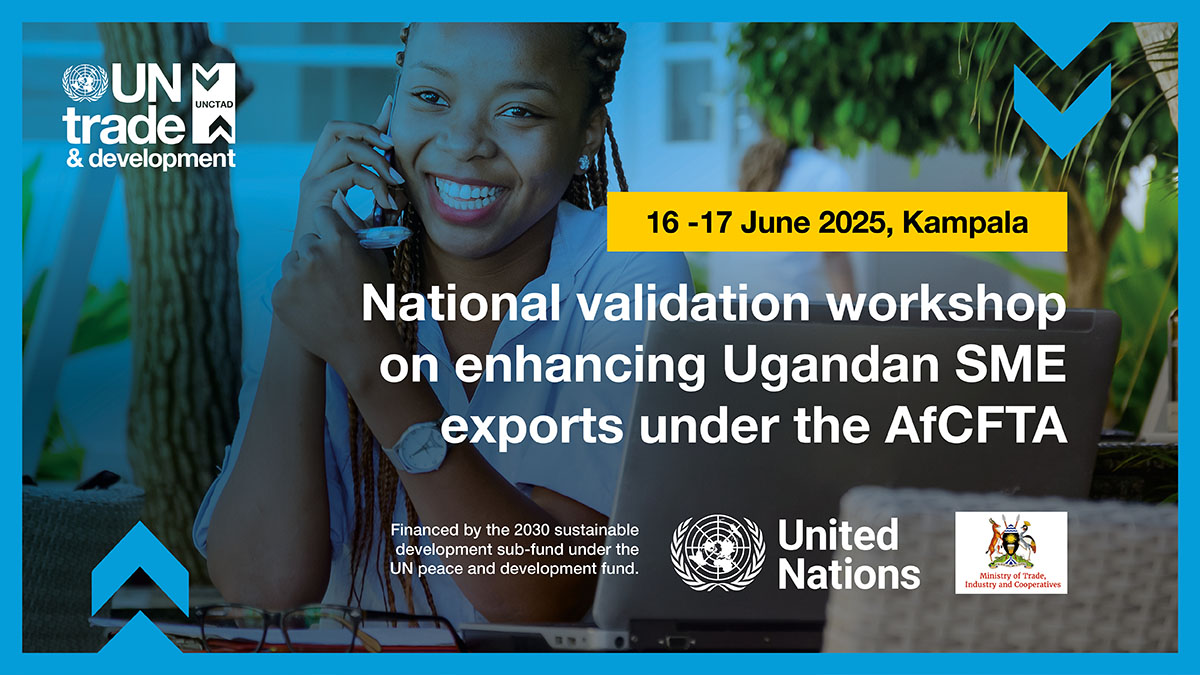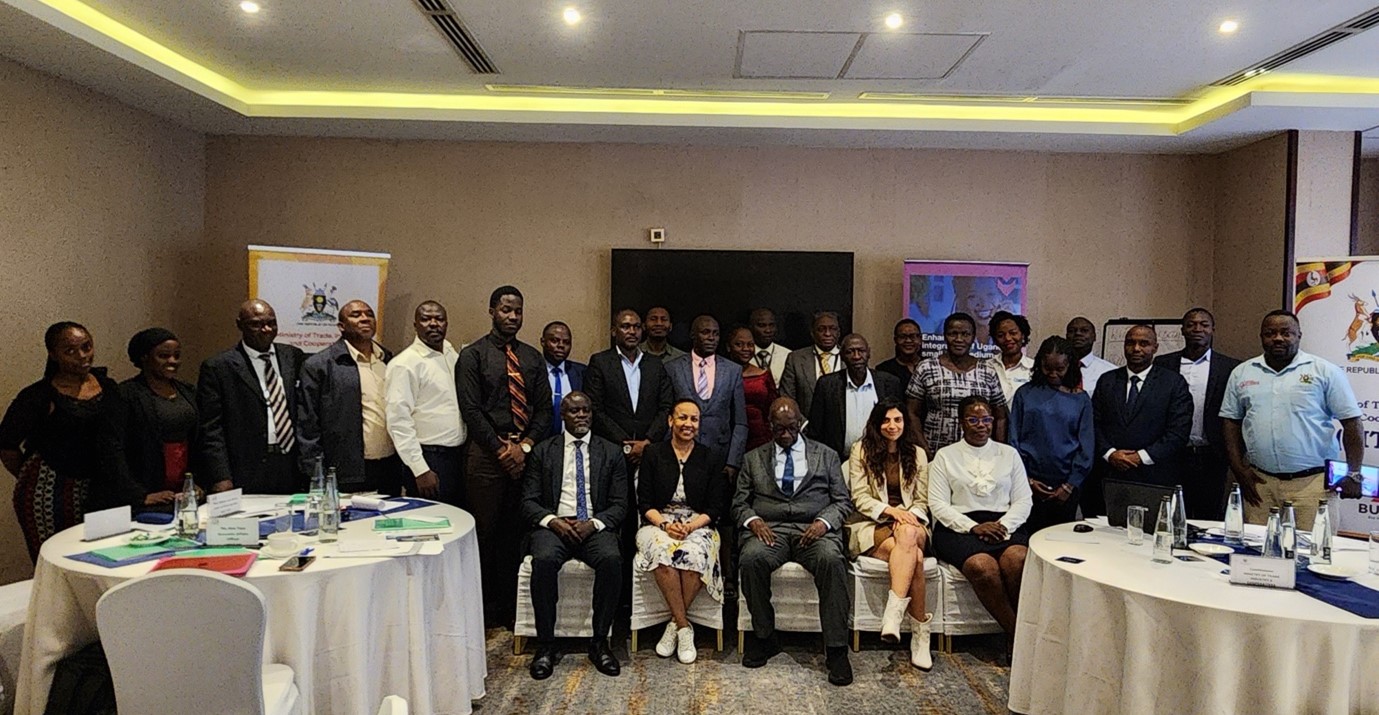In collaboration with the Ministry of Trade, Industry and Cooperatives (MTIC) and the United Nations Resident Coordinator’s Office (RCO), UN Trade and Development (UNCTAD) organized a national validation workshop on 16–17 June 2025 in Kampala, Uganda.
Held within the framework of the UNCTAD project: “Enhancing the capacity of African vulnerable countries in adopting policy incentives and innovative instruments for the participation of small and medium-sized enterprises (SMEs) in regional value chains”, the workshop aimed to present, review and validate the findings of a national study on the participation of Ugandan SMEs in regional value chains under the African Continental Free Trade Area (AfCFTA).
In his opening remarks, Mr. Leonard Zulu, UN Resident Coordinator in Uganda, emphasized the importance of inclusive economic growth: “SMEs are central to our joint efforts to unlock Uganda’s trade potential, strengthen cooperative structures, enhance access to finance and improve value chains… Through this project, we are working to bridge persistent inequalities, increase financial inclusion and support SMEs as drivers of industrialization and regional trade”.
The study noted that Uganda has achieved steady economic growth over the past two decades, yet its export base remains narrow, with primary commodities like coffee, gold and fish dominating. Although Uganda exports a higher share of manufactured goods to African markets, particularly through the East African Community (EAC), structural barriers continue to limit the participation of SMEs in regional trade. These include non-tariff barriers, informal cross-border trade, and limited access to formal markets and value chains.
Moreover, the study identified strategic opportunities in sectors such as automotive, iron & steel, dairy, fish, coffee and pharmaceuticals. In particular, the automotive and steel sectors, which collectively accounted for nearly 12% of total intra-African trade in 2023, were highlighted as promising entry points for Uganda to strengthen local productive capacities and embed SMEs into regional value chains.
The workshop convened over 40 participants from government institutions, SMEs and development partners. Participants engaged in thematic working groups and plenary discussions to review the findings and propose policy recommendations. Among the key takeaways from the thematic group sessions were the need to:
- Leverage the AfCFTA to strengthen regional sourcing and trade integration;
- Empower SMEs as active industrial stakeholders, including through implementation of Uganda’s 2020 Industrial Policy;
- Improve branding and marketing, particularly for key exports such as coffee;
- Harmonize public support mechanisms and better tailor existing policies to reflect Uganda’s MSME landscape;
- Align and strengthen regional arrangements such as the Tripartite Agreement (EAC–SADC–COMESA);
- Improve data availability and research on non-tariff barriers and SME-specific challenges.
His Hon. Francis Mwebesa, Minister of Trade, Industry and Cooperatives, closed the workshop by reaffirming Uganda’s commitment:“By linking these two sectors [automotive and steel], Uganda can lay the foundation for regional supply chain integration under the AfCFTA, positioning our country as a competitive hub for steel-based automotive components and value-added mineral processing”. He also commended the ICBT data mobile app, currently being developed by UNCTAD in the framework of the project, describing it as a tool to enhance market transparency and empower informal traders, especially women and youth.
The findings and recommendations from the workshop will inform the finalization of the national report and the design of future technical assistance and training programmes to support SME participation in regional value chains.
Photo: (Front) Mr. Simon Peter Nsereko, National Economist at the UNRCO Uganda, Mrs. Habiba Ben Barka, Chief of Africa Section at UNCTAD, H.E Mr Francis Mwebesa, Minister of Trade, Industry and Cooperatives of Uganda, Ms. Sine Tepe, Economist at UNCTAD, Ms. Susan Namyalo, Senior MSMEs Officer at the MTIC and participants at the national validation workshop.
Uganda has experienced steady economic growth, yet its trade structure remains highly dependent on a limited number of commodities, which hinders economic diversification. While regional trade within frameworks like the East African Community, the Common Market for Eastern and Southern Africa, and the African Continental Free Trade Area (AfCFTA) present opportunities, Small and Medium-sized Enterprises (SMEs) in Uganda face challenges integrating into regional value chains (RVCs) due to barriers like high costs, regulatory barriers, and limited access to financing, market information and technology. To address these issues, UNCTAD has launched a project aimed at enhancing SMEs participation in RVCs by equipping policymakers and businesses with essential tools, policy incentives, and market insights.
Organized in collaboration with the Ministry of Trade, Industry and Cooperatives and the UN Resident Coordinator’s Office in Uganda, the workshop aims to validate the findings of the UNCTAD impact study, which assesses the challenges and opportunities for Ugandan SMEs in participating in regional value chains under AfCFTA. Building on the earlier consultation workshop, this two-day event will gather stakeholders from the public and private sectors, academia and development partners to peer-review the study’s recommendations, identify policy tools and incentives, and strengthen dialogue around SME competitiveness and regional trade integration. The workshop will also place emphasis on sectors with high SME potential, including iron and steel, automotive, dairy, coffee, fish, and pharmaceuticals.
Bringing together approximately 45 participants, the workshop will cover thematic discussions, presentations and recommendations to refine the project’s implementation in Uganda. Participation is by invitation only.


